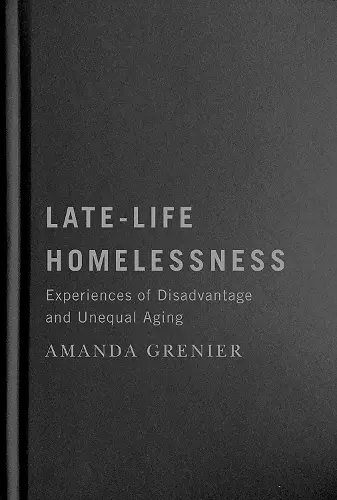Late-Life Homelessness
Experiences of Disadvantage and Unequal Aging
Format:Hardback
Publisher:McGill-Queen's University Press
Published:15th Jan '22
Currently unavailable, our supplier has not provided us a restock date

A critical analysis of aging on the streets, in shelters, and in long-term care in Canada.
Late-Life Homelessness is the first Canadian book to address this often neglected issue. Drawing from a four-year ethnographic study of late-life homelessness in Montreal, Canada, Amanda Grenier uses a critical gerontological perspective to explore life at the intersection of older age and homelessness.
Around the world and across a range of contexts, homelessness among older people is on the rise. In spite of growing media attention and new academic research on the issue, older people often remain unrecognized as a subpopulation in public policy, programs, and homeless strategies. As such, they occupy a paradoxical position of being hypervisible while remaining overlooked.
Late-Life Homelessness is the first Canadian book to address this often neglected issue. Basing her analysis on a four-year ethnographic study of late-life homelessness in Montreal, Canada, Amanda Grenier uses a critical gerontological perspective to explore life at the intersection of aging and homelessness. She draws attention to disadvantage over time and how the condition of being unhoused disrupts a person’s ability to age in place, resulting in experiences of unequal aging. Weaving together findings from policy documents, stakeholder insights, and observations and interviews with older people, this book demonstrates how structures, organizational practices, and relationships related to homelessness and aging come to shape late life.
Situated in the context of an aging population, rising inequality, and declining social commitments, Late-Life Homelessness stresses the moral imperative of responding justly to the needs of older people as a means of mitigating the unequal aging of unhoused elders.
"Amanda Grenier critically and intelligently unpacks how declining social commitments and responses has led to disadvantage that culminates in unequal aging. This book is a clarion call to pay attention to an issue many refuse to acknowledge: the growing group of aging homeless Canadians. The scholarship and methodology used are exceptional. In fact, it is one of the best ethnographies I have read in a long time." Kelli Stajduhar, University of Victoria
ISBN: 9780228008354
Dimensions: unknown
Weight: unknown
352 pages